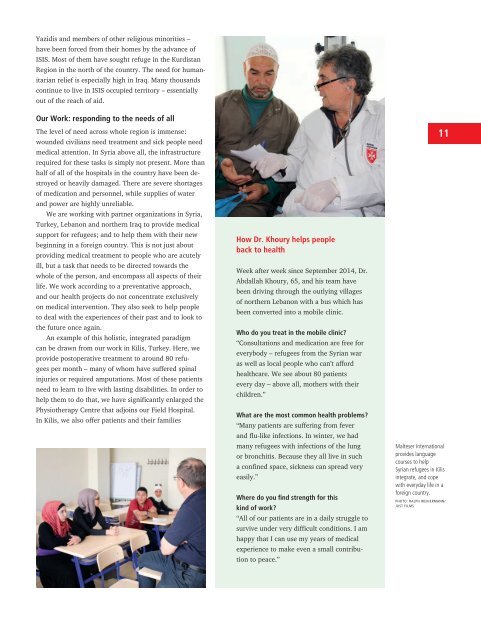Malteser International Annual Report 2014
MalteserRapportannuel-2014
MalteserRapportannuel-2014
- No tags were found...
You also want an ePaper? Increase the reach of your titles
YUMPU automatically turns print PDFs into web optimized ePapers that Google loves.
Yazidis and members of other religious minorities –<br />
have been forced from their homes by the advance of<br />
ISIS. Most of them have sought refuge in the Kurdistan<br />
Region in the north of the country. The need for humanitarian<br />
relief is especially high in Iraq. Many thousands<br />
continue to live in ISIS occupied territory – essentially<br />
out of the reach of aid.<br />
Our Work: responding to the needs of all<br />
The level of need across whole region is immense:<br />
wounded civilians need treatment and sick people need<br />
medical attention. In Syria above all, the infrastructure<br />
required for these tasks is simply not present. More than<br />
half of all of the hospitals in the country have been destroyed<br />
or heavily damaged. There are severe shortages<br />
of medication and personnel, while supplies of water<br />
and power are highly unreliable.<br />
We are working with partner organizations in Syria,<br />
Turkey, Lebanon and northern Iraq to provide medical<br />
support for refugees; and to help them with their new<br />
beginning in a foreign country. This is not just about<br />
providing medical treatment to people who are acutely<br />
ill, but a task that needs to be directed towards the<br />
whole of the person, and encompass all aspects of their<br />
life. We work according to a preventative approach,<br />
and our health projects do not concentrate exclusively<br />
on medical intervention. They also seek to help people<br />
to deal with the experiences of their past and to look to<br />
the future once again.<br />
An example of this holistic, integrated paradigm<br />
can be drawn from our work in Kilis, Turkey. Here, we<br />
provide postoperative treatment to around 80 refugees<br />
per month – many of whom have suffered spinal<br />
injuries or required amputations. Most of these patients<br />
need to learn to live with lasting disabilities. In order to<br />
help them to do that, we have significantly enlarged the<br />
Physiotherapy Centre that adjoins our Field Hospital.<br />
In Kilis, we also offer patients and their families<br />
How Dr. Khoury helps people<br />
back to health<br />
Week after week since September <strong>2014</strong>, Dr.<br />
Abdallah Khoury, 65, and his team have<br />
been driving through the outlying villages<br />
of northern Lebanon with a bus which has<br />
been converted into a mobile clinic.<br />
Who do you treat in the mobile clinic?<br />
“Consultations and medication are free for<br />
everybody – refugees from the Syrian war<br />
as well as local people who can’t afford<br />
healthcare. We see about 80 patients<br />
every day – above all, mothers with their<br />
children.”<br />
What are the most common health problems?<br />
“Many patients are suffering from fever<br />
and flu-like infections. In winter, we had<br />
many refugees with infections of the lung<br />
or bronchitis. Because they all live in such<br />
a confined space, sickness can spread very<br />
easily.”<br />
Where do you find strength for this<br />
kind of work?<br />
“All of our patients are in a daily struggle to<br />
survive under very difficult conditions. I am<br />
happy that I can use my years of medical<br />
experience to make even a small contribution<br />
to peace.”<br />
11<br />
<strong>Malteser</strong> <strong>International</strong><br />
provides language<br />
courses to help<br />
Syrian refugees in Kilis<br />
integrate, and cope<br />
with everyday life in a<br />
foreign country.<br />
Photo: Ralph Weihermann/<br />
Just Films


